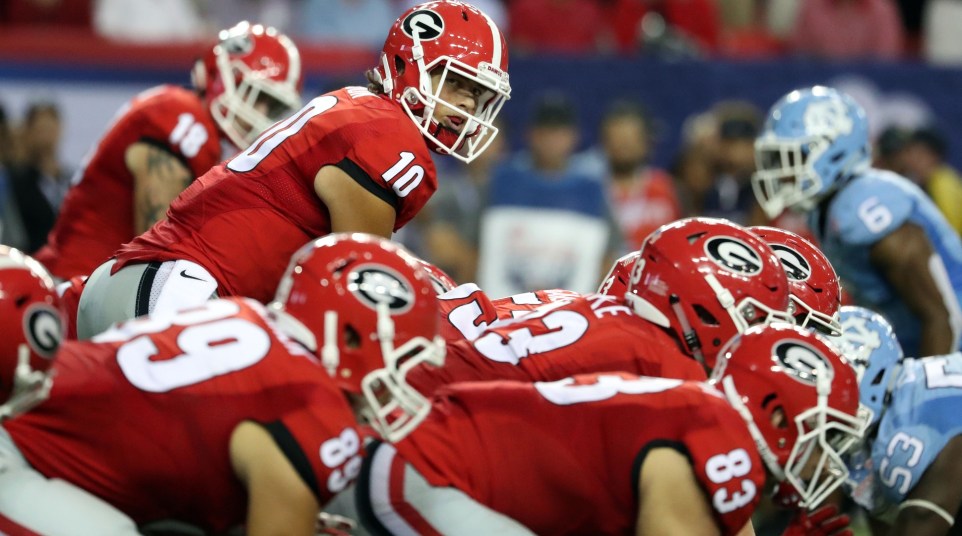
Chubb stuck in gear? Georgia's running problems start up front
Georgia is 3-0, but it’s clear that the offense isn’t running smoothly. Or much at all.
The issue starts up front, with the offensive line.
Georgia’s running game was expected to be the team’s major strength this season. That notion was further confirmed in the season opener against North Carolina when the Bulldogs gained 289 yards on the ground.
After three weeks, however, that opening-weekend outburst looks more like an anomaly than the team’s offensive identity.
Against Nicholls State, an FCS program that finished with a 3-8 record in 2015, Georgia managed just 125 yards on the ground and averaged a meager 3.1 yards per carry. All-SEC running back Nick Chubb was held under 100 yards for the first time as a starter.

Credit: Dale Zanine-USA TODAY Sports
The coaching staff understood it was a problem after the unsettling 26-24 victory over the Colonels and made it a point of emphasis leading up to their SEC opener against Missouri.
“Well, we can get better, that’s the one thing we can do,” Kirby Smart said of the offensive line after the Nicholls State game. “We can’t go change the guys out, we’ve got no free agency, we’ve got no cuts. So, we have to take what we’ve got and we have to get those guys better.”
That improvement never manifested itself in Georgia’s thrilling 28-27 win over Missouri. The Bulldogs mustered only 101 yards on the ground, the team’s lowest total since last year’s 27-3 loss to Florida. Chubb was held to 63 — his lowest total in a game with at least 12 carries. His longest run was a modest 16 yards, the second consecutive week he failed to break a 20-yard run or longer. That’s particularly telling considering he’s had 16 games with at least one carry that long.
Georgia had such a tough time gaining any traction up front in the run game, that freshman quarterback Jacob Eason had to throw the ball 55 times, a freshman-record and tied for the third-most in UGA history. That is a major problem moving forward.
It’s not as though Chubb has been hampered by his injury or Sony Michel is suddenly a different running back than the one who rushed for over 1,000 yards last season. There simply aren’t any running lanes available.
Before Saturday’s win at Missouri, Pro Football Focus released an article highlighting “5 crazy good stats” from the first two weeks of college football. Sitting No. 1 on that list was this little nugget.
“1. 234 of Nick Chubb’s (RB, Georgia) 302 yards have come after contact
Much has been made of Chubb’s devastating knee injury last October. Through two games, he seems to be fully recovered. Chubb leads the country with 234 yards after contact. Only 13 running backs in the country have more total yards than Chubb has after contact. One of the reasons for the large percentage of yards after contact is Georgia’s inability to run block – ranked 118th through the first two weeks. If the Bulldogs offensive line can mesh as a unit, Chubb can run them into the college football playoff.”
The Bulldogs returned three starters from last year’s unit that finished No. 38 in the country with 192.15 rushing yards per game, Brandon Kublanow, Greg Pyke and Isaiah Wynn. New to the line are left tackle Tyler Catalina and guards Dyshon Sims and Lamont Gaillard.
It can sometimes take time to create familiarity among offensive linemen, but two new additions shouldn’t cripple the group. Catalina, in particular, struggled in the passing game against Missouri’s elite pass rusher, Charles Harris. The primary issue, however, remains on the ground.
“We can’t be one-dimensional, so we’ve got to find creative ways to (run the ball),” Smart said of the offense after the Missouri game. “We’ve done all we can with Isaiah (McKenzie). It’s a matter of opening some holes. And the more they respect Jacob, and we hit those (passing) plays, it’ll loosen up.”
Everything Smart said after the Bulldogs’ win at Missouri regarding the run game is accurate. Georgia has tried various ways to incorporate McKenzie into the rush attack with jet sweeps, and it even went into the Wildcat formation during the fourth quarter.
That’s a troubling sign, however for a team with a running back who has Heisman-caliber skills and a deep stable of players behind him. Georgia shouldn’t have to rely on gimmicks to gain yards on the ground, nor should it have to expect its true freshman quarterback to help the run game ease into a rhythm when it was supposed to be the other way around.
But that’s the reality right now. Fortunately, Eason appears to have plenty of substance to go along with his recruiting hype. His fourth-quarter comeback likely will give coordinators another thing to think about moving forward, which should benefit the running game.
Ultimately, though, to win in the SEC, teams need to win the battle on the line of scrimmage. Through three games, Georgia has yet to clearly do that.
The Bulldogs are about to enter a tough SEC stretch that will define the 2016 season. Eason has done his part to help Georgia win its first three games, but the offensive line will be needed to help it win from here on out.
William McFadden covers the University of Georgia for Saturday Down South. For news on everything happening between the hedges, follow him on Twitter @willmcfadden.
